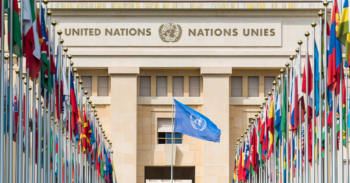 At a hearing in Geneva on Thursday and Friday this week, the United Nations Committee on the Rights of the Child (CRC) has held Governments in the UK to account for discriminatory education policies around religious education (RE), collective worship, and faith school admissions. Officials representing the UK Government (for England), Welsh Government, and Northern Ireland Government, have resisted calls for reform. Humanists UK, which campaigns for an end to discrimination in schools on grounds of religion or belief, and had given evidence to this effect to the CRC prior to the session, said it was disappointed but not surprised by government intransigence.
At a hearing in Geneva on Thursday and Friday this week, the United Nations Committee on the Rights of the Child (CRC) has held Governments in the UK to account for discriminatory education policies around religious education (RE), collective worship, and faith school admissions. Officials representing the UK Government (for England), Welsh Government, and Northern Ireland Government, have resisted calls for reform. Humanists UK, which campaigns for an end to discrimination in schools on grounds of religion or belief, and had given evidence to this effect to the CRC prior to the session, said it was disappointed but not surprised by government intransigence.
The 93rd session of the CRC is an opportunity for the Committee to monitor progress on implementation of the UN Convention on the Rights of the Child (UNCRC), which was ratified by the UK Government in 1991. A key element of the UNCRC is Article 14, which states that countries must respect children’s rights of freedom of religion or belief. It was suggested this week by the CRC that governments in the UK may be failing to uphold Article 14 due to: compulsory collective worship in schools, narrow RE curriculums where for example non-religious worldviews are not given equal respect to religions, and state-funded faith school admissions policies that discriminate according to the religious background of children.
All state schools – even those that have no religious character – in England, Wales, and Northern Ireland are required to hold a daily act of religious collective worship. While parents have a right to withdraw their children, children aged under 16 are unable to withdraw themselves from such sessions. This therefore fails to uphold their freedom of religion or belief, and was highlighted by the CRC this week. The law is also unpopular with parents. Humanists UK campaigns for inclusive assemblies in place of collective worship. In response to the CRC, officials from the UK Government said that they had no plans to reform collective worship laws around the right of children to withdraw themselves from worship.
The CRC also drew attention to faith school admissions policies. One third of schools in England and Wales are faith schools, and are able to discriminate in their admissions policies depending on the religious background of the child. There is evidence that such discrimination leads to social and economic division. No response from the UK Government was provided to this question during the session.
RE in Northern Ireland is set by the four main churches, is often exclusively Christian in character, and has been found by the High Court to be discriminatory against a non-religious family. The CRC asked the UK to explain why there was such a narrow curriculum in Northern Ireland. There was no response to this point on RE, but the Northern Ireland Department of Education did make reference to recent work to promote Integrated Education, as a result of the 2022 Integrated Education Act.
Where points raised by the CRC were not responded to directly during the oral hearing, the UK delegation pledged to respond in writing within 48 hours.
Humanists UK Education Campaigns Manager Robert Cann said:
‘We are pleased to see the United Nations once again holding governments in the UK to account for their failure to uphold children’s freedom of religion or belief. But the response from our governments continues to be stubborn refusal to face the facts: collective worship laws, narrow RE curriculums, and faith-based discrimination in state schools admissions, are all clear breaches of the UNCRC and are out of step with the changing demographics of an increasingly non-religious society.
‘It’s been over 30 years since the UK ratified the UNCRC, so it’s appalling to once again see that our governments in the UK don’t seem to care about children’s rights in this way. We are disappointed but not surprised: there seems to be a blind spot when it comes to Article 14, and the UK is increasingly becoming an international outlier in this respect. We will continue to keep up the pressure for reform of these archaic laws.’
Notes:
For further comment or information, media should contact Humanists UK Public Affairs Manager Karen Wright at press@humanists.uk or phone 020 3675 0959.
Read more about our work on collective worship, RE, and faith schools admissions.
Watch the UNCRC 93rd Session on the UN website.
Read our submissions to the UNCRC.
Humanists UK is the national charity working on behalf of non-religious people. Powered by 100,000 members and supporters, we advance free thinking and promote humanism to create a tolerant society where rational thinking and kindness prevail. We provide ceremonies, pastoral care, education, and support services benefitting over a million people every year and our campaigns advance humanist thinking on ethical issues, human rights, and equal treatment for all.
